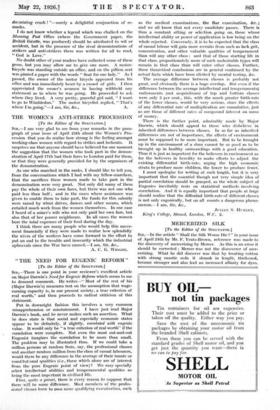" THE NEED FOR EUGENIC REFORM " [To the Editor
of the SPECTATOR.] SIR,—There is one point in your reviewer's excellent article on Major Darwin's Need for Eugenic Reform which seems to me to demand comment. - He writes—" Most of the rest of his (Major Darwin's) measures rest on thc assumption that wage- earning capacity is, in our present society, a true criterion of real worth," and then proceeds to radical criticism of this statement.
Put in downright fashion- this involves a very common misapprehension or misstatement. I have just read Major Darwin's book, and he never makes such an assertion. What he does state is that social and especially economic states appear to be definitely, if slightly, correlated with eugenic value. It would only be " a true criterion of real worth" if the correlation were complete. Not even the most out-and-out Eugenist imagines the correlation to be more than small. The problem may be illustrated thus. If we could take a million persons at random frotn, say, the professional classes and another random million from the class of casual labourers, would there be any difference in the average of their innate or constitutional qualities (i.e., those which alone are of interest from the pure Eugenic point of view)? We may specially select intellectual abilities and temperamental qualities as being the most important in civilized life.
First, quite a priori, there is every reason to suppose that there will be some difference. Most members of the profes- mann! classes hive to pass some qualifying, examination, such as the medical examinations, the Bar, examination, &c..; and we all know that not every candidate passes. There is thus a constant sifting or selection going on, those whose intellectual ability or power of application is low being on the whole rejected. Conversely, it is to be expected that the class of casual labour will gain more recruits from such as lack grit, concentration, and other valuable qualities of temperament than will any other class ; and that of those starting life in that class, proportionately more of such undesirable types will remain in that class than will enter other classes. Further, these theoretical conclusions are in general confirmed by the actual facts which have been elicited by mental testing, &c.
The average difference between classes is probably not great, and obviously there is a huge overlap. But even if the difference between the average intellectual and temperamental endowments (not acquisitions) of top and bottom classes were only 5 per cent., this, with the much greater birth-rate of the lower classes, would be very serious, since the effects of any differential rate of multiplication are cumulative, just as are those of different rates of compound interest on sums of money.
There is the further point, admirably made by Major Darwin, which should appeal to those who disbelieve in inherited differences between classes. In so far as inherited differences are not of importance, the effects of environment must be supposed to be more important. But to be brought up in the environment of a slum cannot be so good as to be brought up in healthy surroundings with a good education. Thus it is just as important for the believers in environment as for the believers in heredity to make efforts to adjust the existing differential birth-rate, urging the high economic strata to produce more children, the lower to produce fewer.
I must apologize for writing at such length, but it is very important that the essential though not very simple idea of partial correlation should be grasped, as the whole subject of Eugenics inevitably rests on statistical methods involving correlation. And it is equally important that people at large should realize that the diffential birth-rate of different classes is not only eugenically, but on all counts a dangerous pheno- rnenon.—I am, Sir, &c.,














































 Previous page
Previous page